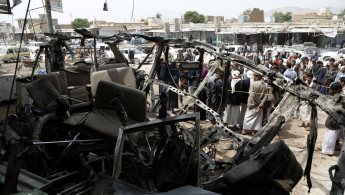Rights group urges investigation into Yemen school bus massacre
The Netherlands-based Rights Radar has called for an international investigation into an airstrike on a school bus on 9 August which killed 51 people, and wounded dozens others.
The group "strongly condemned the frequent targeting civilians in Yemen, by the air raids of the Saudi-led Arab coalition with strong participation and influence of the UAE, without taking into account the rules of engagement during the war," Rights Radar said in a statement to The New Arab.
The group added the massacre is "considered as a clear violation of international conventions and laws that call on parties of armed conflicts to spare civilians direct targeting".
The group has stressed the need to open a file of massacres carried out by all parties in the war in order to hold them to account.
Rights Radar also gathered reports from eyewitnesses to the school bus bombing in Saada.
"The children victims were returning from a recreational picnic organised by the Houthi Summer Center in the town of Dhahyan," an eyewitness told Rights Radar.
Dhahyan is a Houthi stronghold and the Houthi rebels themselves have been hosting summer camps since the early 1990s to promote their ideology.
"The air raid targeted the children bus while it was stopping next to the sidewalk in the crowded Dhahyan market with shoppers at 9am caused a terrible massacre of civilians, where the remains of the victims were scattered, and the place filled with dozens of bodies and wounded people", the eyewitness added.
The eyewitness said the place targeted "is not a military site, it is a crowded market with shoppers and sellers, most of them are internally displaced people (IDPs) from other areas and provinces".
According to a CNN report on Friday, the bomb used was supplied by the United States under a State Department deal with Riyadh.
The numbers on shrapnel, of which images were taken shortly after the attack, indicate that it was a laser-guided Mk 82 bomb manufactured by defence contractor Lockheed Martin.
Since 2015, Saudi Arabia has been leading a military campaign to restore the internationally recognised government to power and push back the Houthis, who still hold the capital Sanaa, after orchestrating a coup.
The United States, France and Britain - three of the five permanent council members - have supported the Saudi coalition in its military campaign against Houthi rebels in Yemen, but have expressed concern over the heavy toll on civilians.
The war has left more than 10,000 people dead and unleashed what the United Nations described as the world's worst humanitarian crisis.





 Follow the Middle East's top stories in English at The New Arab on Google News
Follow the Middle East's top stories in English at The New Arab on Google News
![The UAE is widely suspected of arming the RSF militia [Getty]](/sites/default/files/styles/image_330x185/public/2024-11/GettyImages-472529908.jpg?h=69f2b9d0&itok=Yauw3YTG)
![Netanyahu furiously denounced the ICC [Getty]](/sites/default/files/styles/image_330x185/public/2024-11/GettyImages-2169352575.jpg?h=199d8c1f&itok=-vRiruf5)
![Both Hamas and the Palestinian Authority welcomed the ICC arrest warrants [Getty]](/sites/default/files/styles/image_330x185/public/2024-11/GettyImages-2178351173.jpg?h=199d8c1f&itok=TV858iVg)